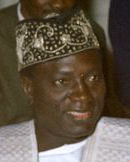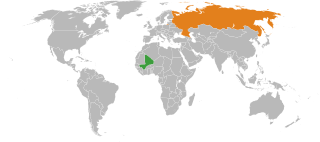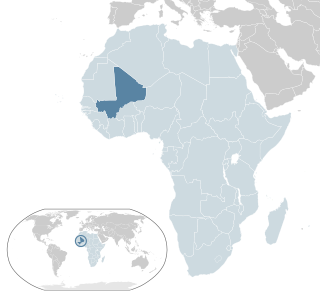Related Research Articles

Mali, officially the Republic of Mali, is a landlocked country in West Africa. Mali is the eighth-largest country in Africa, with an area of just over 1,240,000 square kilometres (480,000 sq mi). The population of Mali is 19.1 million. 67% of its population was estimated to be under the age of 25 in 2017. Its capital is Bamako. The sovereign state of Mali consists of eight regions and its borders on the north reach deep into the middle of the Sahara Desert. The country's southern part is in the Sudanian savanna, where the majority of inhabitants live, and both the Niger and Senegal rivers pass through. The country's economy centres on agriculture and mining. One of Mali's most prominent natural resources is gold, and the country is the third largest producer of gold on the African continent. It also exports salt.
Mali is located in Africa. The history of the territory of modern Mali may be divided into:

The economy of Mali is based to a large extent upon agriculture, with a mostly rural population engaged in subsistence agriculture.

Bamako is the capital and largest city of Mali, with a 2009 population of 1,810,366. In 2006, it was estimated to be the fastest-growing city in Africa and sixth-fastest in the world. It is located on the Niger River, near the rapids that divide the upper and middle Niger valleys in the southwestern part of the country.

Amadou Toumani Touré was a Malian politician. He supervised Mali's first multiparty elections as chairman of the transitional government (1991–1992), and later became the second democratically-elected President of Mali (2002–2012).

Alpha Oumar Konaré is a Malian politician, who served as President of Mali for two five-year terms from 1992 to 2002 and was Chairperson of the African Union Commission from 2003 to 2008.

Modibo Keïta was the first President of Mali (1960–1968) and the Prime Minister of the Mali Federation. He espoused a form of African socialism.

Moussa Traoré was a Malian soldier, politician, and dictator who was President of Mali from 1968 to 1991. As a Lieutenant, he led the military ousting of President Modibo Keïta in 1968. Thereafter he served as head of state until March 1991, when he was overthrown by popular protests and a military coup. He was twice condemned to death in the 1990s, but eventually pardoned on both occasions and freed in 2002. He retired from public life and died in 2020.

Tiébilé Dramé is a Malian politician who served in the government of Mali as Minister of Foreign Affairs from 1991 to 1992. In the years since, he has remained active on the political scene, while also acting as a diplomat and mediator in regional crises.

The Agacher Strip War or Christmas War was a war fought by Burkina Faso and Mali over a 100-mile (160 km) long strip of land along the border in northern Burkina Faso from 25 to 30 December 1985. The war ended in a ceasefire. The Agacher Strip had been subject to a border dispute between Mali and Burkina Faso since the 1960s. Following armed clashes in 1974, both countries agreed to mediation to resolve their differences. Progress on a solution stalled, and in 1983 Burkinabé President Thomas Sankara and Malian President Moussa Traoré decided to have the border dispute settled by the International Court of Justice and subsequently petitioned the body to resolve the issue.
Democratic Union of the Malian People was a political party in Mali. Its main organ was the daily newspaper L'Essor-La Voix du Peuple, which had a circulation of 40.000. It was the largest newspaper in the country as of the mid-1980s.

The Alliance for Democracy in Mali – Pan-African Party for Liberty, Solidarity and Justice is a political party in Mali.

Articles related to Mali include:

Mali–Russia relations is the bilateral relationship between Mali and Russia.

Choguel Kokalla Maïga is a Malian politician and President of the Patriotic Movement for Renewal, a political party in Mali. He served in the government as Minister of Industry and Trade from 2002 to 2007 and later as Minister of the Digital Economy, Information and Communication from 2015 to 2016.

Canada–Mali relations concern the bilateral relationship between the countries of Canada and Mali. Mali has an embassy in Ottawa whilst Canada has an embassy in Bamako.

Parliamentary elections were held in Mali on 23 February 1992 and 8 March 1992, the first after the March 1991 military coup that overthrew President Moussa Traoré. Following the coup, the Comité Transitoire de Salut du Peuple (CTSP) was created to manage the democratic transition. This body established a transitional government headed by Amadou Toumani Touré, the leader of the military group responsible for overthrowing Traoré. The transitional government oversaw a constitutional referendum and municipal elections in January 1992, the parliamentary elections in February and March, and the April 1992 presidential elections.
Django Sissoko is a Malian civil servant who was Prime Minister of Mali from December 2012 to September 2013. He was Minister of Justice from 1984 to 1988 and subsequently served twice as Secretary-General of the Presidency, from 1988 to 1991 and from 2008 to 2011. He also served as Ombudsman from 2011 to 2012.

The 26 March 1991 Malian coup d'état resulted in the overthrow of President Moussa Traoré after over two decades of dictatorship and eventually led to multi-party elections.

The 1968 Malian coup d'état was a bloodless military coup in Mali staged on 19 November 1968 against the government of President Modibo Keïta. The coup was led by Lieutenant Moussa Traoré, who then became the head of state.
References
- ↑ "Trade Union Development Projects Directory - UNTM". ITUC .
- ↑ "USDOS – US Department of State. Country Report on Human Rights Practices for 1986. Mali".
- ↑ Jane Turrittin (November 1991). "Mali: People Topple Traoré". Review of African Political Economy (52): 97–103.
- ↑ Alexis Roay (September 2010). "Peasant struggles in Mali: from defending cotton producers' interests to becoming part of the Malian power structures". Review of African Political Economy. 37 (125): 299–314.
- ↑ ICTUR; et al., eds. (2005). Trade Unions of the World (6th ed.). London, UK: John Harper Publishing. ISBN 0-9543811-5-7.
- ↑ Alex Thurston (2020-11-24). "Malian Labor Threatens a General Strike, and Seeks a Different Kind of State". Sahel Blog .
- ↑ "Mali union starts strike that will include gold mines". 2020-12-14.
- ↑ "Some big Mali gold mines say not affected by general strike". Reuters.